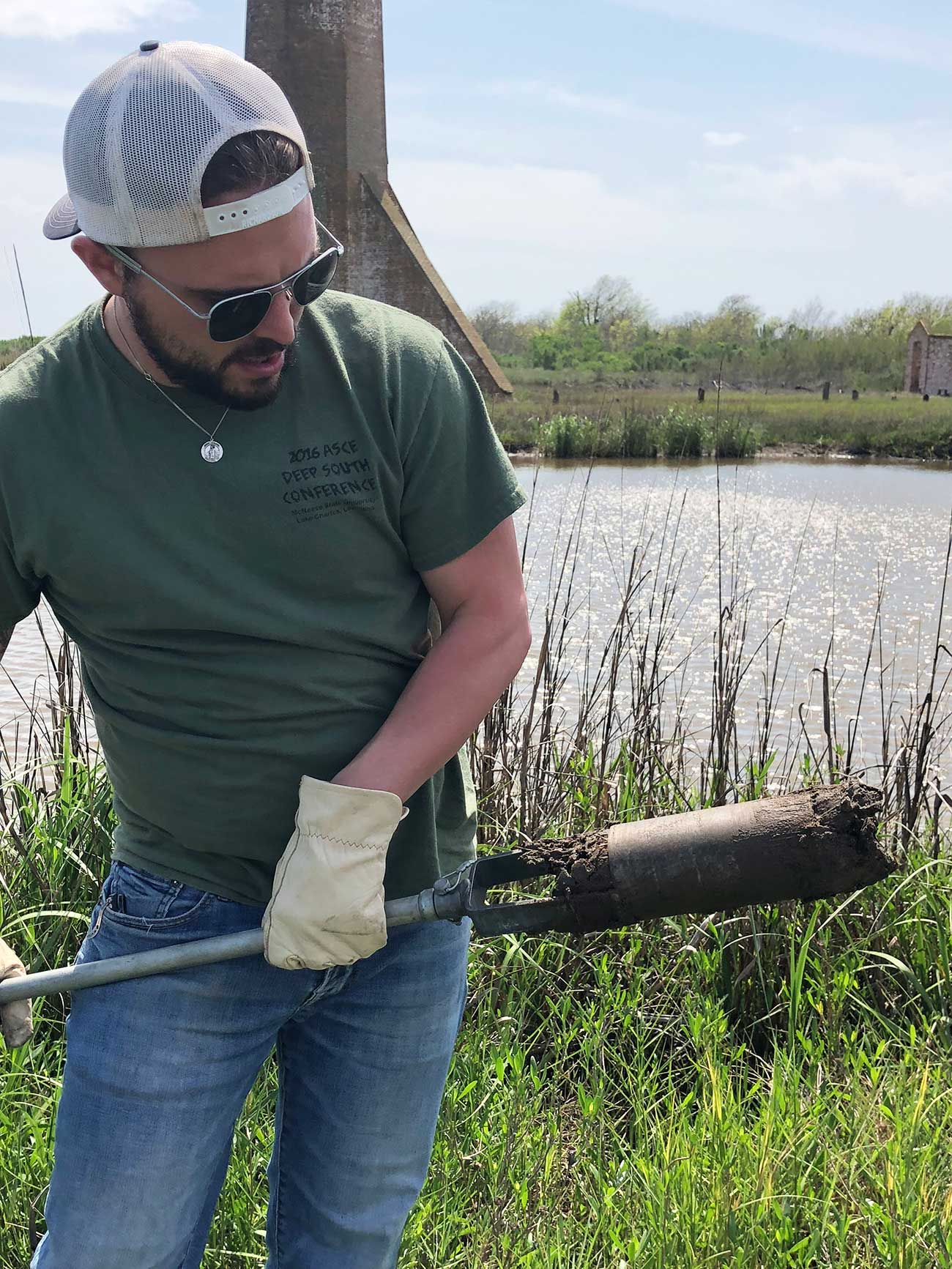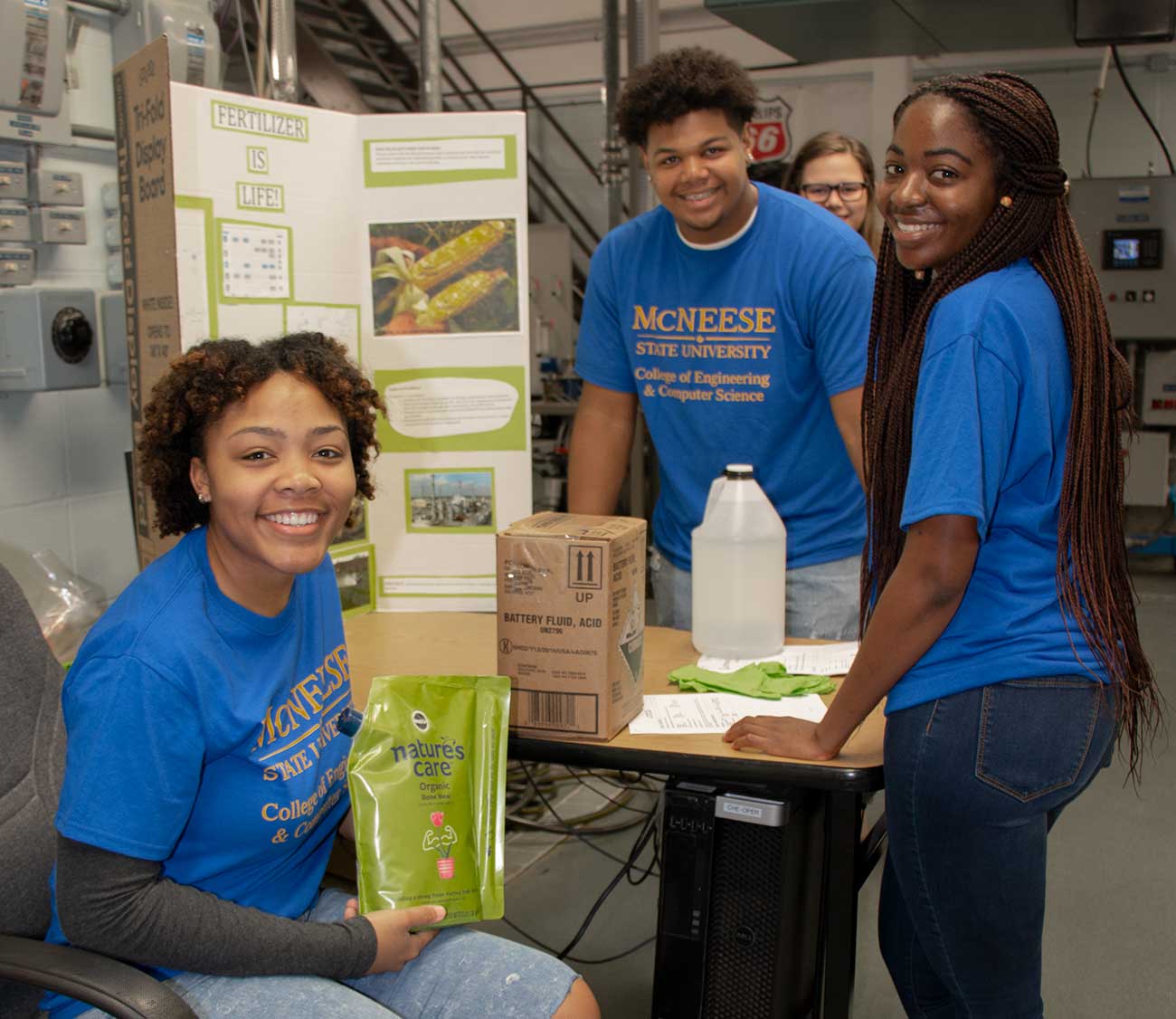Engineering Degree Program Highlights
The mission of the bachelor’s engineering program at McNeese is to combine interdisciplinary curriculum, scholarly development, hands-on training and professional ethics to prepare students to meet the growing demand for engineers and technicians at the local, state and national level. Fueled by partnerships with local industry and accredited by the Accreditation Board of Engineering and Technology (ABET), McNeese’s engineering program ensures both traditional and non-traditional students graduate with the practical experience and theoretical knowledge necessary to become the next generation of industry leaders across a range of disciplines.
Four areas of concentration
McNeese offers concentrations in civil, computer end electrical engineering, as well as a separate Bachelor of Science in mechanical engineering and Bachelor of Science in chemical engineering degrees. Each program offers the opportunity to participate in research projects, gain work experience through co-ops and internships and build global competencies through study abroad experiences – all while working with experienced faculty members.
At a Glance
Degree Type: Bachelor of Science (B.S.)
Program Length: 4 years (128 credit hours)
Availability: in person
Engineering Degree Concentrations
Learn the science of synthesizing, processing, transforming and transporting chemicals and other materials in advanced lab settings with McNeese's Bachelor of Science in chemical engineering.
B.S.Ch.E. Chemical EngineeringIn the civil engineering concentration, you'll explore various concepts related to designing, constructing and maintaining the built environment, including roads, bridges, railways, homes and more.
Civil EngineeringWith the concentration in computer engineering, you'll explore and combine a variety of skills to design and develop computer software and software systems, including artificial intelligence, database systems, programming languages and network security.
Computer EngineeringAs an electrical engineering major, you will learn about electromagnetism, electricity and electronics and discover how to build electrical systems for devices ranging from tabletop robotics to supercomputers.
Electrical EngineeringInterested in learning how to understand, design, build and maintain mechanical systems? McNeese also offers a Bachelor of Science in mechanical engineering.
B.S.M.E. Mechanical EngineeringWhat Can You Do with an Engineering Degree?
With a bachelor’s degree in engineering, you can work in a variety of careers, including engineering services, research and development and manufacturing. You could also continue your education to broaden your knowledge, gain experience, learn new technology or develop project management skills, which will help you qualify for supervisory positions.
Graduate Schools or Programs
- Master of Engineering, Chemical Engineering
- Master of Engineering, Civil Engineering
- Master of Engineering, Mechanical Engineering
Potential Job Titles or Employers - Champion Technology Services
- Cheniere Energy
- Citgo
- ConocoPhillips
- Entergy
- Firestone Polymers
- Flowserve Corporation
- Halliburton
- Honeywell
- Levingston Group
- LyondellBasell
- Northrup Grumman
- Packaging Corporation of America
- Phillips 66
- ReCon Management
- SASOL
- Triad Electric & Controls
- Westlake Chemical

Student Activities
McNeese hosts student chapters for a number of engineering organizations, including:
- American Institute of Chemical Engineers
- American Society of Civil Engineers
- Institute of Electrical and Electronic Engineers
- American Society of Mechanical Engineers
- National Society of Black Engineers
- Society of Women Engineers

Experiential Learning
McNeese students’ studies often take them into the field. Former students have used their engineering skills to preserve a local lighthouse, conduct atmospheric tests with the NASA LaACES balloon project and design tools to help sample volcanic formations on the sea floor.

E-Week
Every year, McNeese celebrates National Engineering Week with events and activities for students of all ages, their parents and the community. Engineering majors demonstrate their knowledge, skills, research and experiments to help encourage engineering awareness and inspire a love of engineering in the next generation.
Additional Details on the Bachelor's Degree in Engineering
Accredited by the Engineering Accreditation Commission of ABET, https://www.abet.org, under the General Criteria.
Engineering Program Educational Objectives (PEOs)
Consistent with McNeese State University’s mission, engineering graduates will:
- Practice engineering and to be successful in solving the engineering problems encountered in industry, government or private practice.
- Possess the motivation and skills to advance into positions of increased responsibility and to pursue continuing education or graduate studies.
- Act as ethical and professional engineers, and also as responsible members of their communities and the larger society.
Engineering Program Student Outcomes (SOs)
At the time of completion of the Engineering Program at McNeese State University, graduates will possess all of the following skills and abilities:
- Identify, formulate, and solve complex engineering problems by applying principles of engineering, science, and mathematics;
- Apply engineering design to produce solutions that meet specified needs with consideration of public health, safety, and welfare, as well as global, cultural, social, environmental, and economic factors;
- Communicate effectively with a range of audiences;
- Recognize ethical and professional responsibilities in engineering situations and make informed judgements, which must consider the impact of engineering solutions in global, economic, environmental, and societal contexts;
- Function effectively on a team whose members together provide leadership, create a collaborative and inclusive environment, establish goals, plan tasks, and meet objectives;
- Develop and conduct appropriate experimentation, analyze and interpret data, and use engineering judgement to draw conclusion; and
- Acquire and apply new knowledge as needed, using appropriate learning strategies.
Programs Related to the Bachelor’s in Engineering
Program Contact
Srinivasan Ambatipati – Department Head
sambatipati@mcneese.edu

